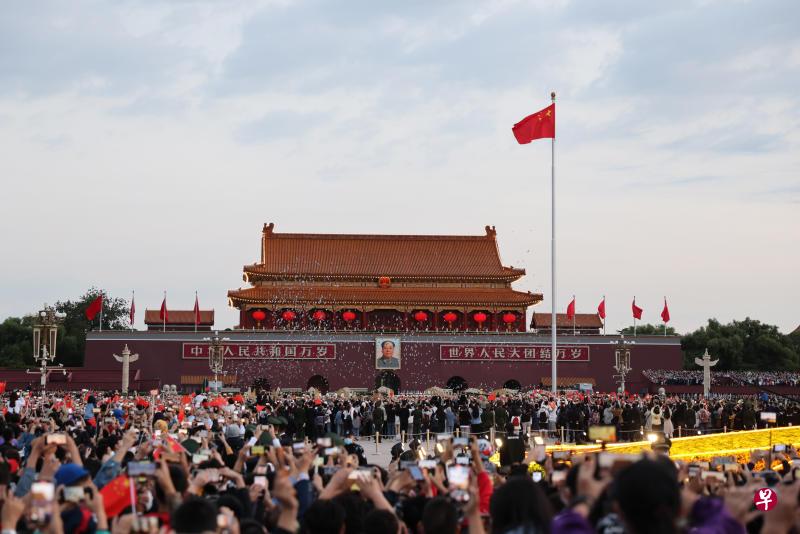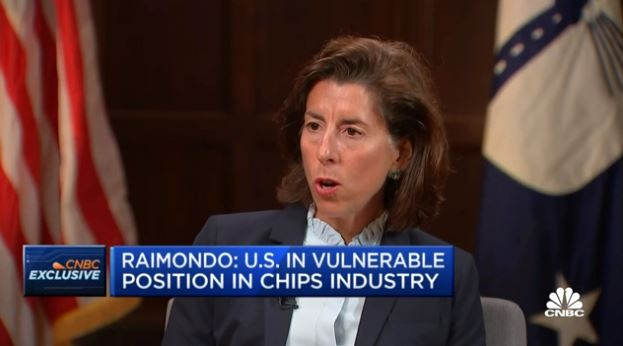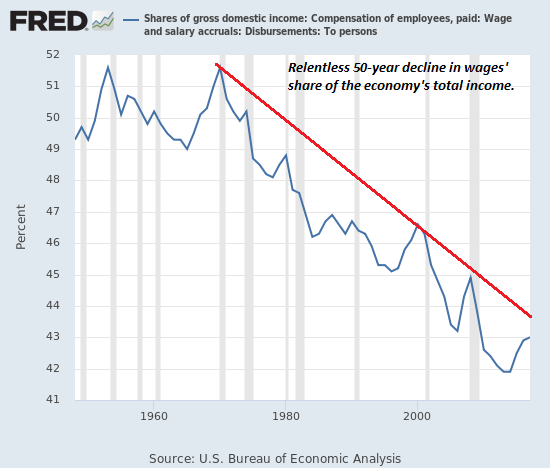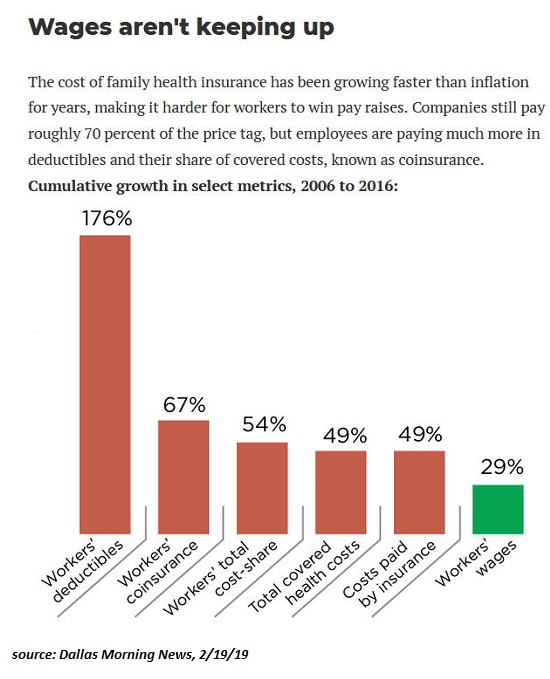布林肯祝贺中国国庆 提及寻求合作共同解决面临的挑战
来自 / 联合早报 | 文 / 杨丹旭
10/01/2021

这是继美国撤销引渡孟晚舟请求、两国防务官员举行会谈后,中美一周内又一积极互动。分析指出,华盛顿和北京正打破长时间僵局,进入更为冷静、务实的接触阶段。不过中美关系中,对抗和竞争的色彩不会淡化。
美国国务卿布林肯在中国国庆前夕发表声明,代表美国向中国人民表达祝贺,并提及寻求合作共同解决面临的挑战。这是继美国撤销引渡孟晚舟请求、两国防务官员举行会谈后,中美一周内又一积极互动。
分析指出,华盛顿和北京正打破长时间僵局,进入更为冷静、务实的接触阶段。不过中美关系中,对抗和竞争的色彩不会淡化。
布林肯在美国国务院网站发布的简短声明中说:“在中国10月1日庆祝国庆之际,我谨代表美利坚合众国,向中华人民共和国人民表示祝贺。美国寻求合作解决我们共同面临的挑战,祝愿中华人民共和国人民在未来的一年里和平、幸福和繁荣。”
在中国国庆节以国务卿名义发出祝贺声明是美国国务院惯例。不过,与上一任国务卿蓬佩奥一年前所发的声明相比,布林肯的声明多了美国寻求合作的内容。
新加坡南洋理工大学拉惹勒南国际研究院副教授李明江接受《联合早报》采访时指出,这份声明的措辞,符合拜登政府近期倾向与中国合作的取态。
跌至冰点的中美关系近期有趋缓迹象。美国司法部上月24日与中国科技公司华为首席财务官孟晚舟达成暂缓起诉协议,撤销对她的引渡请求。历时三年的孟晚舟案告一段落,拔出了中美关系中的一根刺。
中美防务官员近期也进行接触。上月28日至29日,美国国防部分管中国事务的副助理部长蔡斯(Michael Chase)与中国人民解放军国际军事合作办公室副主任黄学平少将通过视频,共同主持第16次美中防务政策协调对话会。
此外,美国商务部长雷蒙多(Gina Raimondo)上月对媒体称,她将设法改善中美商务关系,也打算带领美国企业总裁出访包括中国在内的国家,寻找商机和商讨贸易问题。
8月底至9月初刚刚访华的美国总统气候问题特使克里,上月22日也告诉美国媒体,他计划未来几周内再度访华。
学者:两国关系走向稳定
北京近期同样释放了积极信号,中国国务委员兼外长王毅周一(27日)在与联合国秘书长古特雷斯举行视频会晤时表态说:“美方近期表示不希望对抗,不搞冷战,希望两国关系重回正轨……如果美方履行承诺,中方愿同美方相向而行,共同回答好中美关系向何处去这一世纪之问。”
李明江观察,拜登政府正逐步化解特朗普时代留下来的一些中美关系障碍,例如美国情报机构8月底提交冠病溯源调查报告后,华盛顿已不再纠缠该问题,孟晚舟案也得到解决,“总体上来看,两国关系在逐步走向稳定。”
但李明江不讳言,中美关系大框架不会改变,美国仍会从对抗、竞争、合作三个维度,处理对华关系。他说:“对抗和竞争基本没有变……但在合作方面,和特朗普时代,尤其是特朗普后期基本不在乎是否与中国合作相比,拜登政府显然更重视这一点,并在设法渐进地建立合作关系。”
李明江判断,由于意识到贸易战给美国经济、贸易带来的损失远大于收益,拜登政府下来可能会在经贸领域寻求与北京接触。
中美在特朗普时期展开大规模贸易战,拜登政府上任后迄今未明确表态将如何处理对华贸易问题。美国贸易代表戴琪后天将在华盛顿智库战略研究中心,就拜登政府对中国贸易政策的检讨发表演说。
今年3月上任后,戴琪一直在检讨华盛顿的中国贸易政策,这场演说预计将披露拜登政府在该问题的立场。
U.S. Department of State
The People’s Republic of China National Day
PRESS STATEMENT
ANTONY J. BLINKEN, SECRETARY OF STATE
SEPTEMBER 30, 2021
On behalf of the United States of America, I would like to extend our congratulations to the people of the People’s Republic of China (PRC) as the country celebrates its National Day on October 1.
As the United States seeks to work cooperatively to solve the challenges we all face, we wish the people of the PRC peace, happiness, and prosperity over the coming year.
美国商务部长:美欧需要联手,放慢中国创新脚步
观察者网
9/30/2021
(观察者网讯)美欧“跨大西洋贸易和技术理事会”(TTC)的首次会议将在当地时间9月29日至30日于美国匹兹堡(Pittsburgh)举行。
会前,美国商务部长吉娜·雷蒙多(Gina Raimondo)接受美媒采访时放出话称,为了向世界第二大经济体中国施加压力,美国需要与自己的盟友——欧洲进行合作,以放慢中国创新的“脚步”。
此外,她还对“打压中国”的妄想丝毫不加以掩饰。除了说要遏制中国获得“先进技术”,她还妄称要通过施压来迫使中国“守规矩”。

“和盟友合作时的美国才是最有效的。”雷蒙多在TTC会议的前一天(28日)接受美国消费者新闻与商业频道(CNBC)采访时声称,“如果我们真的想延缓中国的创新速度,我们就需要与欧洲进行合作。”

Tel: 551-580-4856 | Email: F.WINNIE.S@GMAIL.COM
“我们必须与我们的欧洲盟友合作,不让中国获得最先进的技术,使他们无法在半导体等关键领域追赶上来。”面对镜头,她如此说道。
雷蒙多还丝毫不掩饰想要打压中国的态度。
除了无端指责中国“不按规矩做事”以及所谓“正窃取知识产权”,她还扬言要通过“施压”(hold their feet to the fire)的方式来让中国遵守他们的所谓“规矩”。
此外,她还提到,美国要与有“共同价值”的欧洲盟友一起来制定规则,以在大国竞争中制衡中国。她称,“我们希望与欧洲展开合作,制定科技领域的交通规则,无论是在TikTok、人工智能还是网络领域”。

早在拜登还未上台时的去年11月,英国《金融时报》(FT)就曝出一份欧盟的计划草案,其中提到了成立一个旨在重振“跨大西洋伙伴关系”并将中国挤出全球技术贸易的美欧联盟“TTC”。文章认为,这份旨在建立新全球联盟的草案体现出欧盟对于中国掌握地缘政治主动的担忧。
今年6月,欧盟委员会主席冯德莱恩和美国总统拜登在布鲁塞尔举行的美欧峰会上为“扩大和深化贸易与跨大西洋投资关系”并“更新21世纪经济的道路规则”,正式启动了TTC。
据美国白宫本月9日的声明显示,TTC 最初将包括十个工作组,分别为:技术标准合作、气候和绿色科技、供应链安全、信息通信技术安全和竞争力、数据治理和技术平台、滥用技术威胁安全和人权、出口管制、投资筛选、促进中小企业获取和使用数字技术和全球贸易挑战。
另据路透社9月26日消息,欧盟委员会贸易和数字部门两名负责人东布罗夫斯基(Valdis Dombrovskis)和韦斯塔格(Margrethe Vestager)当天表示“TTC具有战略和地缘政治重要性,将赋予欧洲更大的影响力,为21世纪制定标准和规则。”
不过有一点值得注意,东布罗夫斯基斯坚称,“TTC与任何特定的第三国无关,它是关于美国和欧盟在一些政策领域的合作和协调。”
与此相对的是,CNBC、路透社等外媒均提到,美欧成立TTC是旨在共同应对来自中国的“战略挑战”并“牵制中国”(counter China)。
早在今年6月,中国外交部发言人汪文斌就曾表示,美国怎么发展,怎么提升美国的“竞争力”,这是美国自己的事,但我们坚决反对美国拿中国说事,把中国当“假想敌”。
汪文斌说,美国最大的威胁是美国自己,把自己的事办好,比什么都重要。“中国始终坚持走和平发展道路,我们发展的目标是不断提升自我,让中国人民过上更加幸福美好的生活。谁也不能剥夺中国人民享有的正当发展权利。”

TTC的首次会议将于当地时间9月29日在美国匹兹堡举行,届时美国国务卿布林肯、商务部长雷蒙多、贸易代表戴琪,以及欧盟委员会执行副主席东布罗夫斯基、韦斯塔格将出席会议。
美国国务院网站9月28日称,参会的美欧代表们将探索如何“扩大和深化跨大西洋贸易和投资机制”,还将探讨如何更新21世纪的经济规则,以确保贸易和技术政策能够支撑美欧双方在经济方面的“广泛增长”(broad-based growth)并符合他们所谓的“共同民主价值”。
U.S. needs to work with Europe to slow China’s innovation rate, Raimondo says
By Amanda Macias, Kayla Tausche
9/30/2021
KEY POINTS
- Commerce Secretary Gina Raimondo said Tuesday that the U.S. will rally allies in order to mount pressure on the world’s second-largest economy.
- “If we really want to slow down China’s rate of innovation, we need to work with Europe,” Raimondo said.
- On Wednesday, Raimondo alongside Secretary of State Antony Blinken and United States Trade Representative Katherine Tai will hold the inaugural U.S.-EU Trade and Technology Council in Pittsburgh, Pennsylvania.
WASHINGTON – Commerce Secretary Gina Raimondo said Tuesday that the U.S. will rally allies in order to mount pressure on China, the world’s second-largest economy, an approach that differs from the “America First” policies pursued by President Joe Biden’s Republican predecessor, Donald Trump.
“America is most effective when we work with our allies,” Raimondo told CNBC’s Kayla Tausche in an exclusive interview. “If we really want to slow down China’s rate of innovation, we need to work with Europe.”
“They’re ripping off our IP, they are not playing by the rules. It’s not a level playing field. And so we need to hold their feet to the fire to make sure that they do that,” she said, adding that Beijing is “not living up to the agreements that they made.”
When asked if Commerce would take some actions unilaterally to address the great power competition between the U.S. and China in shaping security practices and setting global trade norms, Raimondo again pointed to allies.
“We don’t want autocratic governments like China, writing the rules of the road. We together with our allies, who care about privacy, freedom, individual rights, individual protection, we need to write the rules of the road,” Raimondo said.
The Chinese Embassy did not immediately respond to a request for comment.
On Wednesday, Raimondo alongside Secretary of State Antony Blinken and United States Trade Representative Katherine Tai will represent the Biden administration at the inaugural meeting of the U.S.-EU Trade and Technology Council, or TTC, in Pittsburgh.
Biden’s team will meet with European Commission Executive Vice Presidents Margrethe Vestager and Valdis Dombrovski in hopes of addressing trade disputes, streamlining regulatory procedures and developing “rules of the road” for emerging technologies on both sides of the Atlantic.
“We have to work with our European allies to deny China the most advanced technology so that they can’t catch up in critical areas like semiconductors,” Raimondo said, adding that the Biden administration plans to deepen cooperation with Europe on export controls.
“We want to work with Europe, to write the rules of the road for technology, whether it’s TikTok or artificial intelligence or cyber,” she said.
Last week, Biden met in person with the leaders of Australia, India and Japan at the White House to discuss shared concerns about China’s growing military and economic influence. The leaders also discussed progress on Covid-19 vaccines, technological cooperation, and a free and open Indo-Pacific region as China grows more assertive in there.
The meeting of the Quadrilateral Security Dialogue, or Quad — as the grouping of the four major democracies is called — came just a week after Biden announced a new security pact with the U.K and Australia, a move that angered Beijing.WATCH NOWVIDEO03:46Europe’s direct exposure to Evergrande crisis is limited: European Central Bank
What Collapsed the Middle Class?
By CHARLES HUGH SMITH
02/11/2021
The middle class has already collapsed, but thanks to debt and bubbles, this reality has been temporarily cloaked.
What collapsed the middle class? In many ways the answer echoes an Agatha Christie mystery: rather than there being one guilty party, a number of suspects participated in the collapse of the middle class.
Can we consolidate these dynamics into a few core causal factors? I’ve made the case in the pst few posts that yes, we can: many of these causes are part of a single dynamic, the decapitalization of the middle class and the decay of the ladder of social mobility which enabled tens of millions of workers to transform their wages into productive capital via saving and investment in their own human capital, their own enterprises and assets that earn income.
The Top 10% Is Doing Just Fine, The Middle Class Is Dying on the Vine (2/4/21)
Six Spaces Home Staging

Contact: Hongliang Zhang
Tel: 571-474-8885
Email: zhl19740122@gmail.com
The second primary dynamic is the substitution of debt and speculation for earned income and productive capital. As the purchasing power of the bottom 90%’s wages declines, the status quo has substituted debt for income and speculation for investing in productive capital.
Debt and the Demise of the Middle Class (2/9/21)
This dynamic incentivizes debt, speculation and consumption rather than producing, savings and investments in human and productive capital. The source of this incentive structure is the maximization of corporate profits earned by banks loaning money to the middle class and by selling the middle class on superfluous consumption being the signifier of “success” rather than production being the signifier of “success”.
In reality, what counts is agency (control of one’s life, having a voice in governance) and ownership of productive capital. Becoming a debt-serf to buy more stuff and grab a few chips in the speculative casino sacrifices both agency and the acquisition of productive capital. But this sacrifice is oh-so profitable to the financier purveyors of debt and speculative gambles in the casino.
The third dynamic is globalization, and specifically the tyranny of global markets. Global banks and corporations are ideally placed to profit from the arbitrage of labor, environmental regulations, currencies, corruption (dear in some places, cheap in others) and the price of debt and risk.
Wage earners have no such leverage. In effect, all the risks of competition are eliminated for corporate monopolies and cartels while the risks are transferred to workers who face a global race to the bottom in wages, opportunity and income security.
The fourth dynamic is speculative bubbles put many assets out of reach of the bottom 90% who have only their wages and savings. The winners in speculative bubbles are those fortunate enough to have bought homes, bonds, rental properties, land, etc. decades ago when a house could be had for three times median income and bonds paid solid, above-inflation returns.
The bottom 90% attempting to find productive assets at affordable prices now are out of luck. Consider a 900 square foot home built in 1916 in the desirable San Francisco Bay Area community of Albany, CA. The house sold for $135,000 in 1996, 3.8 times the national median household income.
Then Housing Bubble #1 boosted the value to $542,000 in 2004, 12.2 times the national median household income. Housing Bubble #2 has pushed the value to slightly over $1 million, 14.5 times the national median household income. Only those inheriting wealth (or who chose wealthy parents), those earning over $250,000 annually or speculators who just scored big gains in bitcoin or GameStop could afford this very small, modest house.
That’s what speculative bubbles do to the middle class: they leave them behind forever. Those who bought 25 years ago entered the top 10% in wealth due to the bubblicious increase in the value of their home. A few winners in the casino who sold at the top might have edged into the top 10%, but the vast majority of gamblers in the casino cannot compete with the insiders, manipulators and pros, so they lose ground. This is why the bottom 90% collect an insignificant 3% of all income from capital.
Jay Taylor and I discuss The Upcoming Revolt of the Middle Class (22 min)
These four primary dynamics manifest in the following ways. Each one helps generate a two-tier Neofeudal Economy of a Financial Aristocracy and its top 9.9% technocrat class who own virtually all the productive capital and the bottom 90%, a disenfranchized ALICE (assets limited, income constrained, employed) workforce.
1. The shifting of pension and healthcare costs and risks from the state and employers to employees. (see chart below)
2. The decline of safe, secure high-yielding investments as central banks have driven savers into risky, crash-prone speculative assets such as stocks and junk bonds.
3. The decline of scarcity value in college diplomas that were once the ticket to middle class security. How Many Slots Are Open in the Upper Middle Class? Not As Many As You Might Think (March 30, 2015).
4. The inexorable rise in big-ticket costs: higher education, healthcare and housing. Even as wages stagnate, these costs continue rising, claiming an ever-larger share of household incomes, leaving less to save/invest.
5. The transition from a stable economy with predictable returns to a financialized boom-and-bust economy that wipes out middle class wealth in the inevitable busts but does not rebuild it in the booms.
6. The regulatory and administrative barriers to self-employment, forcing most of the workforce into wage-slavery and/or dependence on the state. Endangered Species: The Self-Employed Middle Class (May 2015).
7. The rising exposure of the U.S. workforce to highly educated, lower-cost competing workforces in a globalized economy.
8. The decline of labor’s share of the U.S. economy: the slice of the pie distributed to earned income has been declining for decades.
9. The share of the earned-income slice going to the top 5% is rising.
10. The wealth of the middle class is tied up in the family home, a non-income producing asset prone to the wild swings of housing bubbles and busts. Stagnation Nation: Middle Class Wealth Is Locked Up in Housing and Retirement Funds (October 25, 2017).
The middle class has already collapsed, but thanks to debt and bubbles, this reality has been temporarily cloaked. All bubbles pop and all excessive debt ends in default. When these inevitably occur, the reality can no longer be hidden.



Source: http://charleshughsmith.blogspot.com/2021/02/what-collapsed-middle-class.html
哈佛教授沃尔特:四个要点说明美国的好运即将用尽
文章来源: 星岛日报
01/31/2021
《外交政策》杂志近日刊出美国哈佛大学国际关系教授沃尔特的评论认为,美苏上个世纪冷战的结果是出现了短暂的单极世界,全世界已没有任何强大的竞争对手能挑战美国,可今天还是这样吗?美国人现在还能继续认为世界就是他们的囊中之物吗?不管他们表现得如何不负责任,事情总是会好起来?可能是,但也可能不是。以下为沃尔特的论点,以四个原因解释为什么说美国的好运可能正在耗尽:
首先,美国自建国以来所享有的自由安全已不像过去那么稳固。举个现成的例子:在不到一年的时间里,新冠病毒的致死人数已超过了美国在一战、朝鲜战争和越南战争期间的战死人数总和。而且我们还得知,有一股外国势力(一般认为是俄罗斯)最近非法侵入了大量政府信息系统,其中许多系统还是美国国家安全体系的一部分。
第二大隐忧是中国,这是一个比前苏联更强大的对手。从1776年到上世纪90年代中期,美国人可能收获到了一长串胜利,但自那以后,中国的成绩单更为亮眼。中国的经济规模将很快大幅超过美国,它早已远离毁灭性战争的威胁,其统治精英也相信他们注定会成为本世纪的一大(如果不是唯一的)领导力量,他们的制度模式总体运行良好,他们充分参与关键国际机构的活动中并出现在这个世界的每一个地区。
质疑美国是否会持续走运的第三个依据是,美国人已开始自己伤害自己。伤害清单很长:故意制造出来的两极分化以及由此产生的政治僵局使得美国难以及时采取行动去应对重大问题;对“自由”盲目崇拜以至于数百万美国人认为在疫情期间拒不佩戴口罩不是愚蠢的行为而是英雄壮举等等。
还有气候变化。如果大气层继续升温,那么无论多么有利的地缘政治条件都无法拯救美国。拥有一个庞大的经济体、一群训练有素的科学家和工程师以及一个具有创新能力的私人部门,可能有助于美国以各种方式减轻、适应和调整环境问题带来的压力,但他们所要应对的挑战却每年都会变得更加严峻。
VOICE
America’s History of Luck Is Running Out
The country’s rise was fueled by fortunate circumstances that seem unlikely to last much longer.
BY STEPHEN M. WALT | DECEMBER 23, 2020

The United States is the luckiest country in modern history. It began as a set of marginal European outposts, separated from the settlers’ home countries by a difficult sea voyage. When the colonies gained independence, they were weak, poor, and fractious. But in less than a century and a half, those 13 original colonies had expanded across North America, survived a civil war, driven other great powers from the Western Hemisphere, and created the world’s largest and most dynamic economy. That ascent didn’t stop until the end of the 20th century, when victory in the Cold War left the United States alone at the pinnacle of power. For a little while.
Americans like to attribute this remarkable story to their ancestors’ virtues, the enlightened wisdom of the Founding Fathers, and the intrinsic merits of America’s peculiar blend of liberal democratic capitalism. But in addition to the considerable cruelty displayed toward the native population and the slaves imported from Africa, good fortune played a major role as well.
Americans were fortunate that North America was rich with natural resources and fertile land, traversed by navigable rivers, and had a mostly temperate climate. And from the very beginning, the United States benefited from rivalries among the existing great powers. France backed the American Revolution in order to weaken its British rival, and the new nation doubled its territory when Napoleon needed money to wage war in Europe and was willing to sell the Louisiana Purchase at a bargain price. War in Europe also helped the United States survive its foolish decision to invade Canada in the War of 1812; Britain was too busy defeating Napoleon to turn its full strength against its obnoxious former colonists. The United States gradually attracted more attention as it expanded across the continent and took Texas, New Mexico, Arizona, and California from Mexico, but the European powers spent most of the time competing with each other and for the most part left the United States alone. By 1900, British concerns about a rising Germany led them to abandon their territorial claims in the Pacific Northwest and South America and appease the United States. And at that moment, the Monroe Doctrine of 1823 became a reality.
Indeed, no other great power has enjoyed the so-called free security that America has possessed since its founding. Apart from Britain, every other major power has been invaded at least once in the past 200 years, and several of them have been conquered and at least temporarily occupied. Even Britain lost some 50,000 civilians to German bombings during World War II. Foreign troops last occupied U.S. soil during the War of 1812, and the continental United States was effectively unscathed during the two world wars that decimated Europe and Asia during the 20th century. That free security also permitted the United States to be the last major power to enter both wars, to suffer the fewest losses, and to emerge in a dominant position when the fighting stopped.
To be sure, U.S. leaders also made some smart decisions that took advantage of these lucky breaks. They adopted a constitution that privileged individual freedom and spurred the creation of a boisterous capitalist economy. They opened the continent to immigrants from all over the world and managed to contain the frictions that waves of immigrants occasioned. And while the shameful legacy of slavery continues to blight the American experience, the North’s victory in the Civil War prevented a permanent division of the continent and allowed the reunited country to reach its full power potential.
Since becoming a great power, the United States has also been fortunate in its choice of enemies. Imperial Germany was a daunting military power, but its armed forces had been depleted by the time the American Expeditionary Force arrived in 1918. The Nazi Wehrmacht was even more capable, but Adolf Hitler was an incompetent strategist, and the Soviet Union did most of the work to defeat Germany anyway. Imperial Japan’s economy was roughly a fifth the size of America’s in 1941, its wartime leadership was deeply divided, and it already had thousands of troops bogged down fighting in China. World War II in the Pacific was hardly a cakewalk, but the outcome was not in doubt once the United States mobilized for war.
The Soviet Union was by far America’s most formidable adversary, but the deck was still heavily stacked in America’s favor. The Soviet economy was significantly smaller, its allies were much weaker and less reliable, and it faced serious rivals on several frontiers while America sat unthreatened in the Western Hemisphere. The Soviet command economy was a wonderland of waste and inefficiency, and Soviet leaders had to devote a much higher percentage of GDP to defense just to keep the United States in sight. Mikhail Gorbachev’s belated efforts to reform the system failed, and the Soviet Union collapsed not with a bang but with a whimper.
The result was a brief unipolar moment when the United States faced no serious rivals and both politicians and pundits convinced themselves that America had found the magic formula for success in an increasingly globalized world. The hubris of the 1990s was to be expected, perhaps: No other country could claim such a long and mostly unbroken run of success, where ill fortune never seemed to hold the country back for long.
Is this still the case today? Can Americans continue to assume that the world is their oyster and that things will always turn out right no matter how irresponsibly they seem to behave?
Maybe, but maybe not. Here are four reasons why the United States’ luck just might be running out.
First of all, the free security that the nation has known since its founding is not quite as profound as it used to be. Don’t get me wrong: Having no serious enemies nearby is still a considerable benefit, and those two vast oceanic moats still protect the United States from a fair number of potential problems. The Pentagon is formally the “Defense Department,” but America’s armed forces don’t spend much time or money defending U.S. soil directly. Instead, they go into harm’s way in order to try to shape political conditions in a host of faraway places. Why can they do that? Because Americans don’t have to worry about an invasion from Canada or Mexico—or anybody else.
Unfortunately, 2020 has given us a grim reminder that the protection the United States once enjoyed is not as ironclad as it once was. Case in point: In less than a year, the coronavirus has killed more Americans than World War I, the Korean War, and the Vietnam War combined. As I write this, the daily death toll in the United States is larger than the number of Americans killed on 9/11. Distance still matters, but it does not protect against every danger.
We also learned last week that a foreign power (generally believed to be Russia) has hacked into a vast array of government computer systems, including many that are part of the U.S. national security establishment. The full extent of the damage is still unknown, but the incident illustrates another vulnerability that distance cannot diminish. The United States is still fortunate to be located where it is, but that advantage is not as great as it once was.
The second cause for concern is China, which is a far more formidable rival than the Soviet Union ever was. Americans may have racked up a long winning streak from 1776 to the mid-1990s, but China boasts a much better record since then. China’s economy will soon be substantially larger than that of the United States, it has stayed out of ruinous wars, its ruling elites believe they are destined to be a (if not the) leading power in this century, their model of single-party state capitalism has generally worked well, and they are fully engaged in key international institutions and in every region in the world. While the Trump administration has been busy flirting with various forms of protectionism, China has been negotiating and signing new trade and investment deals. Beijing’s mishandling of the coronavirus outbreak allowed it to spread abroad, but its subsequent response (and the cooperation of the population) has kept its own death toll below a reported 5,000 lives (in a country of 1.4 billion people). As a result, the Chinese economy is back open for business. The United States had more time to prepare for the pandemic, but the number of dead is well over 300,000, and the U.S. economy is still devastated by lockdowns and other pandemic-related restrictions.
The challenge China poses could be overstated. China’s per capita income is still significantly lower than America’s, and its new power surplus (i.e., the amount of wealth that can be mobilized to shape events elsewhere once domestic needs are met) is smaller. Its splashy Belt and Road Initiative hasn’t gone nearly as well as Xi Jinping hoped, and its recent embrace of belligerent “wolf warrior” diplomacy and its heavy-handed approach toward dissidents, trading partners, and its Uighur minority have sparked growing concerns about China’s long-term intentions. Even so, only an incurable optimist would assume that China will fall by the wayside as readily as America’s earlier rivals did.

A third reason to wonder about the United States’ continued good fortune is the series of wounds Americans decided to inflict on themselves. The list is long: the ; the deliberately manufactured polarization and the resulting gridlock that makes timely action on vital issues difficult to impossible; the fetishizing of “liberty” to the point that millions of Americans think refusing to wear a mask in the middle of a pandemic is not stupid but heroic; the enduring public prominence of a phalanx of liars, charlatans, and trolls who have built lucrative careers spewing a toxic blend of falsehoods and hatred; the pervasive influence of well-funded lobbying organizations whose commitment to truth is paper-thin; the distorting impact of money in U.S. politics and a ramshackle electoral system that increasingly enshrines minority rule; and a foreign-policy elite that is largely free from accountability and seems incapable of learning from past mistakes. I could go on, but you get the idea.
And then there’s climate change. The atmosphere doesn’t care what you or I happen to think about this problem; it’s going to follow the laws of physics and chemistry no matter what we choose to believe. Humans are free to deny the reality of climate change, but the planet isn’t paying attention. Favorable geopolitics won’t rescue the United States if the atmosphere keeps heating up (though some other countries will face even greater hardships), and having big-deck aircraft carriers, sophisticated ballistic missiles, state-of-the-art anti-submarine warfare or cyberwarfare capabilities, and the other trappings of a modern great power won’t help on this front either. A large economy, well-trained scientists and engineers, and an innovative private sector may help the country mitigate, adapt, and adjust in various ways, but the challenges they will have to address grow ever more daunting each year. When you marry what is happening to the planet to the political dysfunctions discussed above, it’s easy to imagine how the United States’ long run of good fortune could come to a sad end in a generation or two.

Am I being too gloomy? I hope so. The United States retains many strengths—especially in science and technology—and its potential rivals face serious problems of their own. A return to the unchecked primacy of the 1990s is not in the cards, but intelligent reforms could go a long way to preserving the security and prosperity of the country along with its core political values. The imminent departure of the Worst President Ever will surely help.

Branch Rickey famously remarked that “luck is the residue of design.” Americans should no longer assume that success is simply their birthright or that Otto von Bismarck was right when he reportedly quipped that there is “special providence for fools, drunkards, and the United States of America.” If Americans want to enjoy a future as favorable as their past, it will take a willingness to work together that has gone missing for a couple of decades. If they can’t bring it back, the United States’ long run of luck is likely to come to an end.
Stephen M. Walt is the Robert and Renée Belfer professor of international relations at Harvard University.
Source: https://foreignpolicy.com/2020/12/23/americas-history-of-luck-is-running-out/





